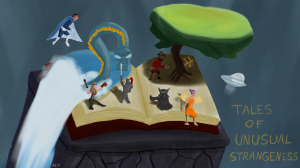The Prompt
The Tale
She was called Christina. Flowing jet black hair, sparkling amber eyes and skin the color of polished ebony. She stood with one hip cocked to the side, dressed in a loose white shirt with a blue floral pattern on it and dark jeans. One manicured hand rested on her hip, the other bent in front of her, a gold chained purse dangling from the crook of her elbow.
Christina was one of several, lining a small shelf in Anton’s studio. Anton had molded her out of clay, just like the others she shared the shelf with. Countless hours had been devoted to refining every feature, giving her eyes just the right shape, her lips the right fullness. Anton agonized over the paint, making sure to pick just the right shades and tones to really bring her to life.
Anton had been making dolls for over a decade, and was a minor celebrity in his town. Fans and admirers just called him The Doll Maker; he doubted many of them even knew his real name. He was beloved for his lifelike clay figurines, each one so different from the one that preceded it. Except, that wasn’t really the case.
Under all the layers of detail, the meticulously tailored clothing and the finely crafted accessories, each doll had the exact same face. The same heart shape, large oval-shaped eyes, upturned nose and pillowy lips. Complexions and hairstyles varied, as did the outfits. He would sculpt a pale blonde in a flowing dress one day and a tanned redhead in a tank top and cargos on another. Yet they would look eerily alike, like an actress dressing up for different roles.
Everyone knew the dolls looked the same, but nobody questioned it. Perhaps that was the limit of Anton’s ability, or maybe he just liked how the face looked. It wasn’t a big concern. The dolls were still beautiful and lifelike, and people were always fascinated to see a new one in the window of Anton’s studio.
All of the dolls were for sale and were purchased by children and adults alike. Christina would soon be put on display to be admired and eventually sold. Anton just had to apply a few finishing touches. She was placed into a small wooden box, which he tucked under his arm.
He flipped the ‘Closed’ sign on his studio door, locked it and went into the backroom. Anton kept most of his supplies there. The room was overflowing with shelves of fabrics, fake hair and paint. Behind one row of shelves, there was a hatch built into the floor. Anton lifted it to reveal a stone staircase leading down to a darkened cellar.
He lit the sconces placed along the walls, illuminating the small room. It was empty, except for a large framed picture hanging one the far wall with a makeshift altar set up under it. Anton placed the box on the altar and took Christina out, resting her on both palms, his arms stretched toward the portrait on the wall.
It was the portrait of a woman, done in hues of gold and rust and bone. She had a look of defiance in her large oval eyes, nostrils flared. Her lips were full, but pressed tightly together. She was the spitting image of Christina and every doll in Anton’s workshop and in the homes of several inhabitants of the neighborhood.
Anton closed his eyes and chanted under his breath. He opened them again and looked at the woman, who floated out of the painting, growing smaller as she approached his hands. She stood on his fingertips, the same size as Christina, then lay down on top of the doll and was absorbed into the clay. Anton uttered another chant. When he looked up, the woman was staring down at him, as she always did.
He put Christina back in the box, blew out the flickering flames in the sconces and made his way back up the stairs. Christina would be placed on the shelf by the window, where she was bound to attract someone’s fancy the next day. Another gushing admirer and another satisfied customer. Anton would write the buyer’s name down in the special notebook he kept under the counter to keep track of his customers.
Only two more dolls had to be sold to complete the pact and grant her passage to the mortal realm. The fragments of her essence that rested inside the dolls would drain the life of the doll owners, transferring it all to her and making her whole again. And Anton would be ready to welcome her, a humble servant and dedicated worshiper.
He smiled and picked up a lump of clay, molding it to form a heart-shaped face.
